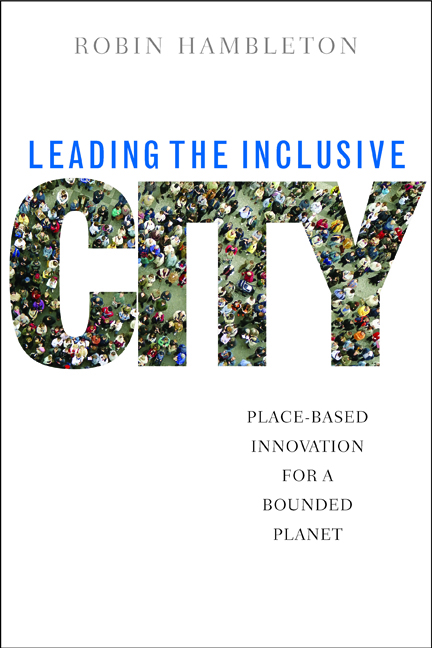Book contents
- Frontmatter
- Dedication
- Contents
- List of figures
- List of innovation stories
- About the author
- Preface
- A guide to the book
- Overview
- Part 1 Diagnosis: Understanding trends and challenges
- Part 2 Concepts: Place, leadership, innovation and democratic governance
- Part 3 Experiences: Place-based leadership in action
- Part 4 Lesson drawing: Insights and international learning
- Notes
- Appendix: International city networks and resources
- Acknowledgements
- References
- Index
Nine - Creating people-friendly cities
Published online by Cambridge University Press: 08 March 2022
- Frontmatter
- Dedication
- Contents
- List of figures
- List of innovation stories
- About the author
- Preface
- A guide to the book
- Overview
- Part 1 Diagnosis: Understanding trends and challenges
- Part 2 Concepts: Place, leadership, innovation and democratic governance
- Part 3 Experiences: Place-based leadership in action
- Part 4 Lesson drawing: Insights and international learning
- Notes
- Appendix: International city networks and resources
- Acknowledgements
- References
- Index
Summary
What are our needs for happiness? We need to walk, just as birds need to fly.
We need to be around other people. We need beauty. We need contact with
nature. And most of all, we need not to be excluded. We need to feel some sort of equality.
Enrique Penalosa, former mayor of Bogota, UN World Urban Forum, Vancouver, 22 June 2006
Introduction
Not many urban leaders rush to proclaim that their city is unfriendly to people. A potential problem with the phrase ‘people-friendly city’ is, then, that, in and of itself, it signifies relatively little. Everyone can sign up to it. The discussion that follows attempts to move beyond bland claims, and identify the main building blocks that might be expected to feature in practical strategies designed to create people-friendly cities.
A quotation from William Shakespeare's Coriolanus was used at the beginning of Chapter 7 to highlight the importance of people in any sensible discussion of the city. Sicinius Velutus asks: ‘What is the city but the people?’ This famous dictum provided the prelude to a chapter focussed on the nature of democratic urban governance, and alternative ways of strengthening citizen power in the city. In this chapter we again focus on people and we will, again, refer to the vital importance of citizens having a central role in the decision-making processes that shape the urban environment and local life chances. However, our focus this time will be less on the process of democratic decision-making and more on the substantive outcomes effective place-based leadership aims to deliver.
A central theme that will emerge is that, to deserve the name, people-friendly cities have to be inclusive cities. Our starting point is human happiness. The literature on happiness, and the idea of developing public policies that promote happiness, has expanded in recent years (Ben-Shahar 2008; Layard 2011; Montgomery 2013). There are several strands here – some relating to personal growth and development, some relating to public policy and some relating to both.
In relation to public policy we can note that there is growing pressure to reconsider what we actually mean by improvements in ‘living standards’ (Sen 1984).
- Type
- Chapter
- Information
- Leading the Inclusive CityPlace-Based Innovation for a Bounded Planet, pp. 237 - 256Publisher: Bristol University PressPrint publication year: 2014



